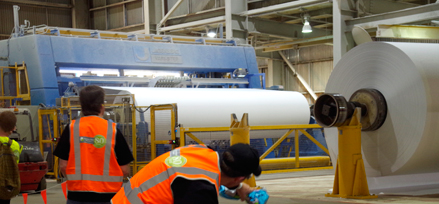
Australian Paper’s $600 million energy from waste proposal at its Latrobe Valley plant has been given an ‘environmental tick’ from EPA Victoria. The EPA has issued a Works Approval, which means the project meets the EPA’s stringent emissions standards. Source: Philip Hopkins for Timberbiz
The Works Approval application is a key part of Australian Paper’s $7.5 million feasibility study into the proposed plant at the company’s Maryvale mill.
The project would annually divert about 650,000 tonnes of residual waste from Melbourne and Gippsland landfill. The feasibility study is equally funded by the Australian and Victorian Governments and Australian Paper.
The proposed 225 Megawatt thermal energy plant, which would reduce the mill’s reliance on gas and coal-fired electricity, is an integral part of Australian Paper’s investment and growth strategy.
The project will use the best available emissions control techniques to comply with stringent European industrial emissions directive limits.
AP’s general manager of corporate development, David Jettner, said the EPA Works Approval had involved a stringent process.
“Our facility is the first EfW project in Victoria to achieve a Works Approval by meeting the EPA’s stringent emissions standards,” he said.
“EfW is the missing link in Victoria’s waste management infrastructure. The Works Approval is a significant step towards a $600 million investment in the Latrobe Valley economy.”
Mr Jettner said a recent health impact assessment by EnRisks confirmed that the plant’s impacts on community health would be negligible.
During construction, the project is expected to create annually 690 jobs in the Latrobe Valley region and more than 300 once operational.
The impact would be felt across Victoria, with more than 1600 jobs supported annually during construction and more than 440 once operational.
Mr Jettner said the Works Approval meant AP was closer to completing the feasibility study.
“We are now working to secure long-term access to residual waste supply and finalise engineering, procurement and construction details for the project,” he said.
“We can then transition to closing out our financial arrangements for this exciting project.”
The company’s Sustainability Report said AP needed the energy from waste (EfW) to cut its huge energy costs. EfW was a proven technology that had been used in Europe, North America and Japan for decades.
“EfW plants can capture and convert the released heat into steam and electricity with sophisticated filtering technology ensuring compliance with stringent EPA stack emissions standards,” the report said.
“EfW plants can provide energy as steam or electricity and can interchange between the two during the plant’s operation, providing improved flexibility and efficiency.”
The Maryvale mill supports about 2400 jobs in the region. AP is owned by Nippon Paper Industries, one of the top 10 paper companies in the world.
Nippon has invested more than $1 billion in AP over the past decade, with total asset replacement value of the Maryvale mill now more than $3 billion.






